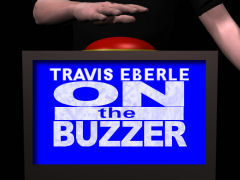|
It's a Big Deal - March 1
While listening to the overnight guy on Seattle's KIRO-AM
710, the topic turned to game shows. The host for that
shift has been on quite a few different game shows,
including a loss on "Jeopardy!" and five wins on The
Challengers. The rest of the hour is just a blur, but
one comment by the host stuck in my head. He said that
"Deal or No Deal" had set back television by at least
ten years. This got me to thinking if that's true or
not. It's time to break this down.
"Deal or No Deal" is by no means a hard game to play or
watch. Host Howie Mandel starts the show by saying that
there aren't any trivia questions or insane stunts, all
you need is a little luck and a great sense of timing.
So it's not "Jeopardy!" or "Millionaire," but that's OK.
For me, it's all about the watching. I'm resigned to the
fact that I most likely won't ever get on a TV game
show, so I only get to play vicariously. On a show like
"Jeopardy!" or "Millionaire," I can call out the
answers. On "Deal or No Deal," I can imagine how much I
would want to take away, whether I would push the button
or not. It boils down to being fun to watch. And if it
means that I get an hour of television that I enjoy,
where's the bad? It holds a place that would be taken up
by a 'reality' potboiler or an unfunny sitcom. I'm
happy.
So, clearly I enjoy the show, and 10 million people a
night did too. The second issue at hand is whether TV
shows should be held up on a pedestal. I don't think so.
Television has always been about entertaining the
masses. That's why shows like "Double Dare" and "History
IQ" had short runs, and "Wheel of Fortune" and "The
Price is Right" are at the top of the heap. Again, it's
not a judgment, it is what it is.
Anyone who says that television should be highbrow,
educational and informative is just missing the point.
For years, situation comedies have given us a chance to
laugh at things we never would laugh at ourselves. Only
on TV could a sixteen year old boy wreck the family car,
promise he'll be more careful in the future, and by the
next week, it's as if nothing had ever happened. "Deal
or No Deal" is similar. When else will you ever get a
chance to choose between a sure thing of $359,000, or
one of $25, $500,000, and $750,000? Unless you're
offered a bribe for your silence, probably never. It's
not real life. It's not supposed to be real life. I'm
not surrounded by twenty-six pretty and perky models
whenever I decide to cook dinner or eat out? Hell, I
probably don't even know 26 women all told, family
included. But for an hour, I can escape into their
world, where a banker offers bundles of money just to
stop a game. Let that sink in: the player is being
offered for doing nothing other than randomly picking
the 'correct' numbers. It sounds dumb, and it is. Even
so, it's still very compelling.
Earlier this week had one of the greatest contestants in
game show history in Peter Montesanti, the man who dealt
to win $359,000. He was a contestant coordinator's
dream: excited, outgoing, and happy to be there without
being obnoxious. I wanted him to take the banker for all
he was worth, and he did. When Howie opened the case
revealing $25, I was happy, not just that the contestant
made the right decision, but that the entire game was
played as well as can be.
Watch the show. You won't learn about African capitals
or neurology, but you'll have a rollicking good time.
You can thank me later.
Travis Eberle is using all of this to hide the fact
that he just likes watching 26 beautiful women carrying
a large amount of money. E-mail him at traviseberle@gmail.com. |

